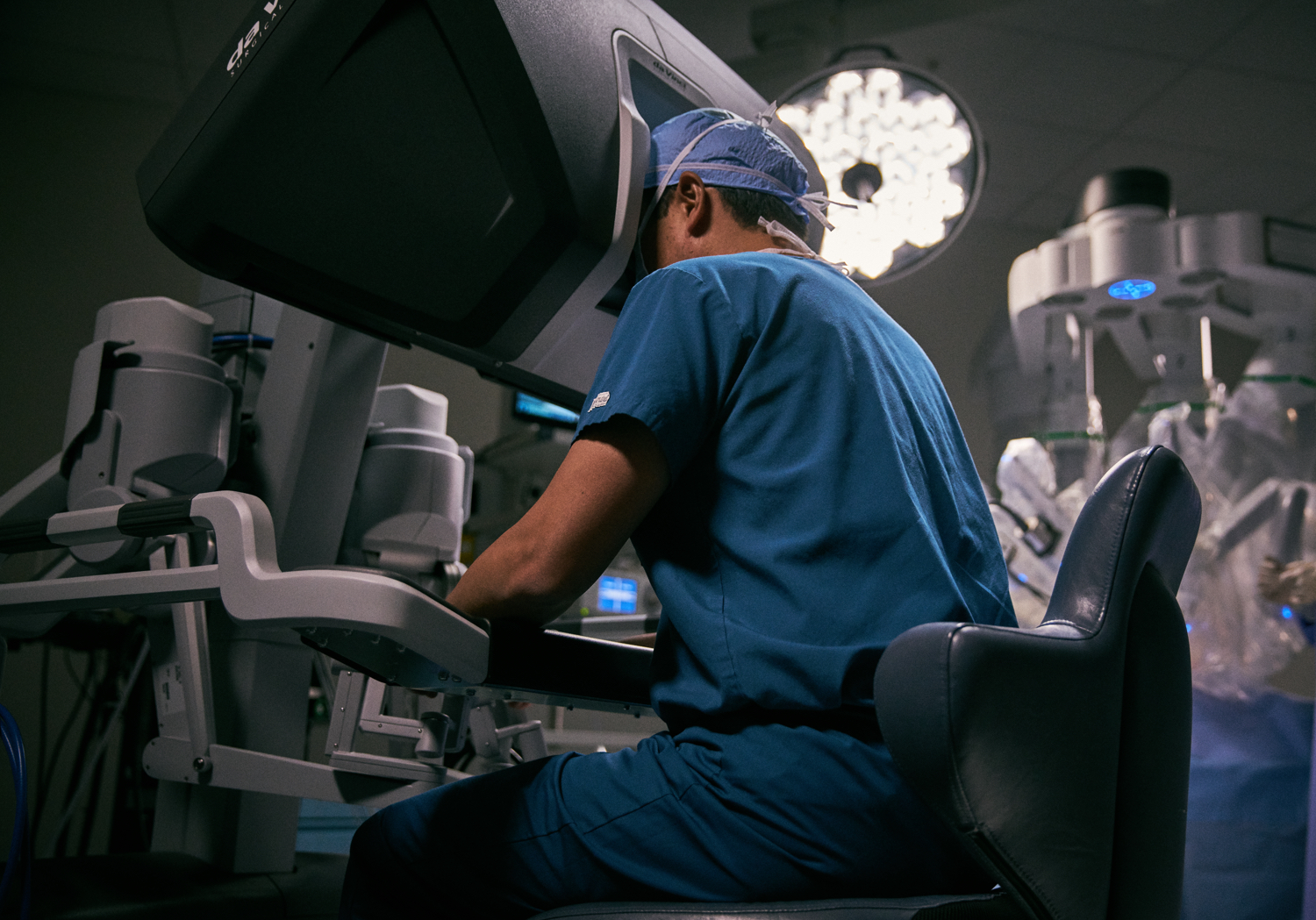
The daVinci® Surgical System at Rome Health
Until recently, if you were diagnosed with a condition requiring surgery, your choices were either traditional surgery with a large, open incision or laparoscopy, which involves small incisions but is generally limited to simpler procedures.
Now, thanks to the daVinci® Surgical System, there's an effective, minimally invasive alternative. This system allows surgeons at Rome Health to perform complex procedures through just a few small incisions using a high-definition 3D vision system and tiny, instruments that can bend and rotate far more than the human wrist. For patients, daVinci® surgery often means smaller incisions, less pain, a shorter hospital stay, a quicker return to normal activities, and potentially better clinical outcomes.
Despite being known as robotic surgery, it's important to understand that the daVinci® system does not operate independently. Your surgeon, who has undergone extensive training with the da Vinci system, controls every aspect of the surgery with its assistance. The robotic arms allow the surgeon to perform intricate procedures in a confined space with remarkable precision and dexterity.
Meet the Team
Robotic technology complements our surgeons’ expertise by extending the capabilities of our eyes and hands. For patients, it means smaller incisions, faster recovery time, minimal scarring and pain, less trauma on the body and shorter hospital stays.
Bariatrics | Weight Loss Surgery
Keneth Hall, MD
General Surgery
Keneth Hall, MD
Samuel Molica, DO
Mark Williams, MD
Gynecology
Lauren Giustra, MD
Ankur Desai, MD
Urology
Po Lam, M.D., Medical Director
daVinci® Procedures
Rome Health's Robotic Program offers the following procedures:
Bariatric | Weight Loss Surgery
- Gastric Bypass (Roux En Y)
- Gastric Bypass (Gastric Sleeve)
General Surgery
- Appendectomy
- Cholecystectomy (Gall bladder)
- Umbilical Hernia Repair
- Ventral Hernia Repair
- Inguinal Hernia Repair
- Hiatal Hernia Repair
Gynecological Procedures
- Hysterectomy
- Tubal Ligation
- Myomectomy
Urological Procedures
- Prostatectomy
Planning and Preparation before surgery
The most important thing you can do before surgery is to talk to your surgeon and follow all instructions from your care team. Here’s a list of additional ideas to help you get ready for surgery day.
Follow all care team instructions: Your surgery care team will provide a list of important instructions to follow before and after surgery. If you haven’t received a list, ask for one.
Check your insurance coverage: To avoid unexpected medical bills, talk to your health insurance provider about your upcoming surgery. Find out what your insurance covers and if you need any preauthorizations.
Prepare for limitations after surgery: Knowing what you may or may not be able to do after surgery (i.e. lifting, walking, driving, etc.) can help you make arrangements for at-home care, transportation, food, childcare, pet care, and other tasks of daily living.
Pack a bag: If you may be staying at the hospital overnight, bring your toothbrush, toothpaste, deodorant, and other personal items you will need. Leave your valuables, such as your watch and jewelry, at home.
Dress for comfort: Wear comfortable clothing and shoes for your surgery appointment.
Get ready for check-in: Bring your identification, insurance cards, a copy of your Advance Directive, if needed, and a form of payment to cover any copayments that may be required by your insurance.
Prepare for your recovery
Your doctor may share a post-surgery checklist, but no two people are alike. Be sure to tell your doctor about your situation—your work and family demands, exercise habits, and activities that are important to you. By being specific, your doctor can let you know what you’ll need to do differently during recovery and when you can expect to get back to normal activities. Here are questions you can ask.
Care: What kind of care will I need when I get home? Will I need someone to stay with me full time? Will my care provider need to be able to lift me from a chair or bed?
Pain: How long does post-surgery pain typically last? What do I need to know about pain management medications?
Diet: Will I have any food or drink restrictions and for how long? Are there foods you recommend?
Activity: What activity restriction do I need to be aware of, i.e, sitting in a chair, lifting, having sex, climbing stairs?
Getting Back to Normal: How long before I can return to work or resume my usual activities?
Exercise: How long before I can start exercising again?

